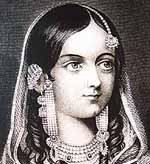
It so happened that Bahadur Shah Zafar's favorite wife, Begum Zeenat Begum asked Ghalib to write a 'sehra' (a tribute, if you will,) for her son, Shehzada Mirza Jawan BaKhth's wedding. Complying with the Begum's wish, Ghalib wrote a 'sehra' whose maqt'a said:
'hum suKhan_fehm haiN, Ghalib ke tarafdaar nahiN
dekheN keh de koi is sehre se baRh kar sehra'
(I'm someone who appreciates poetry, am not partial to Ghalib
Let's see if there's anyone who can write a better 'sehra')
It's believed that the Emperor wasn't pleased with the maqt'a. He was told that it was a dig at ShaiKh Ibrahim Zauq, Zafar's ustaad. Taunting the 'ustaad' was tantamount to slighting the Emperor and his taste, and all the rest of it. Zafar asked Zauq to write a 'sehra' as well and Zauq's 'sehra' had a maqt'a which was something of retort to Ghalib's maqt'a:
jin ko daawa ho suKhan ka yeh sunaa do unko
dekh is taraH se kehte haiN suKhanwar sehra
(Tell those who claim to be poets
This is how poets write a maqta'a)
Ghalib wrote his celebrated apology, 'qat'a-e-ma'azerat' in response to the Emperor's reaction, clarifying his position. The most interesting part is that the great master laced every single 'shayr' with veiled irony in his inimitable style and didn't leave a single opportunity to take a dig at 'Zauq':
manzoor hai guzaarish-e-ahvaal-e-waaqa'aii
apna bayaan-e-Husn-e-tabii'yat nahiN mujhe
sau pusht se, hai pesha-e-aaba sipahgari
kuchh shayari, zari'ye-e-izzat nahiN mujhe
aazaadah rau huN, aur mira maslak hai sulH-e-kul
hargiz kabhi kisi se adaawat nahiN mujhe
kya kam hai yeh sharaf ke Zafar ka Ghulaam huN
maana ke jaah-o-mansab-o-sarwat nahiN mujhe
ustaad-e-shah se ho mujhe parKhaash ka Khayaal
yeh taab, yeh majaal, yeh taaqat nahiN mujhe
jaam-e-jahaaN_numa hai shahenshaah ka zameer
saugand aur gawaah ki Haajat nahiN mujhe
maiN kaun, aur reKhta, haaN is se mudda'a
juz inbisaat-e-Khaatir-e-Hazrat nahiN mujhe
sehraa likhaa gaya ze_rah-e-imtiSaal-e-amr
dekhaa ke chaarah Ghair ita'at nahiN mujhe
maqt'e meiN aa paRi hai suKhan gustaraana baat
maqsood is se qat'a-e-moHabbat nahiN mujhe
ruu-e-suKhan kisi taraf ho, tau ruu_siyaah
sauda nahiN, junooN nahiN, veHshat nahiN mujhe
qismat buri sahii, pa tabii'yat buri nahiN
hai shukr ki jagah, ke shikaayat nahiN mujhe
saadiq huN apne qaul meiN Ghalib Khuda_gawaah
kehta huN sach ke jhooT ki a'adat nahiN mujhe


6 comments:
I would like to add a couple of things to this excellent post.
A sehra is a garland, or flower wreath, that is tied around the groom's head, and falls over his face. The poem that is recited on the occasion of the wedding is also called the sehra, since the radif of each sher is "sehra". Thus, the poem is overtly in praise of the sehra, but the poet usually manages to bring in humor, and wit, and the names of friends and family of the groom.
The sehra tradition is still alive today. I heard a fine sehra at a wedding I attended last month in Lucknow.
A wonderful book that I'm currently reading - "The Last Mughal" by W. Dalrymple - opens with this sentence:
"The marriage procession of Prince Jawan Bakht left the Lahore Gate of the Red Fort at 2 a.m. on the hot summer night of 2 April, 1852."
and then describing the wedding, he writes:
"...what was remembered longest and discussed most eagerly was not so much the festivities or the feasting or the fireworks, as the marraige odes recited by the Poet Laureate Zauq, and his rival Mirza Nausha, now more widely known by his pen-name Ghalib."
The sehra by Ghalib is readily available, but I haven't been able to find the sehra by Zauq. If anyone has it, can you please post it?
The maqta, as Saty Saahab has said is:
"jin ko daawa ho suKhan ka yeh sunaa do unko
dekh is taraH se kehte haiN suKhanwar sehra"
Thank you.
bahut hi khoobsurat, i thoroughly enjoyed it
maja aa gaya janaab
keep it up
thx for such a good blog
Bahuth Khoob! Main kya kahu... Laajawab kar diya aapne. Kamaal hai... Itni jaankaari... Keep up the fantastic work !! Will be visiting often... God bless u!
Friends,
we seem to have missed the best part of this apology.
Zauq was supposed to be of a dark complexion. So consider the following sheyr again:
ruu-e-suKhan kisi taraf ho, tau ruu_siyaah
sauda nahiN, junooN nahiN, veHshat nahiN mujhe
what brilliance! he is as if saying that if my ruu-e-sukhan (the face of my poetry) is pointed at someone in particular then let my ruu (face) turn dark.
But we know exactly what he means. He means, the face of my poetry is supposed to be pointing at someone then indeed it is pointing at the the whose face is dark.
What brilliance.
i needed zauq's poetry to ghalib for a play...................and this was helpful thnxxxxxxxxx1
Post a Comment